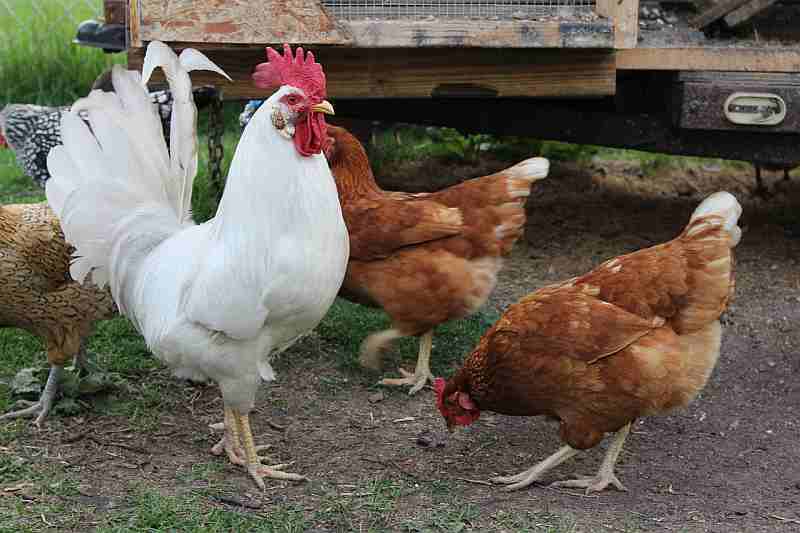Have you ever wondered why do chickens peck at each other, and do they do it as a form of communication? You’re not alone. This curious behavior, often observed in poultry farms and backyard coops, forms part of what experts call the ‘pecking order’.
Chickens, it seems, have a complex social structure that they navigate through pecking. But is it all about dominance and hierarchy? Or could there be other reasons, perhaps health or environmental issues, triggering this behavior?
As we unravel the mystery behind this peculiar chicken conduct, you’ll gain insights that could transform how you manage your feathery friends.
Understanding Chicken Behavior
To truly grasp chickens’ pecking behavior, you’ll need to delve deep into their unique world, observing and analyzing their actions and interactions. Chicken communication isn’t as straightforward as you might think. It’s a complex system of vocalizations, body language, and even pecking.
Pecking isn’t just about aggression; it’s a way to establish hierarchy, express distress, or indicate breeding behavior.
Speaking of breeding behavior, it’s directly linked with pecking. During courtship, roosters may peck hens gently to catch their attention. On the flip side, aggressive pecking can be a sign of overcrowding or stress.
Understanding these behaviors isn’t just enlightening; it’s crucial for raising healthy, happy chickens. So, invest time in learning their language. You’ll be surprised by what you discover.
Role of Pecking in Social Hierarchy
Building on this understanding of pecking as a form of communication, let’s explore how chickens use it to establish and maintain their social hierarchy. This pecking order offers numerous benefits that ensure flock health and productivity:
- Stability: The hierarchy dynamics keep the flock peaceful by minimizing resource fights.
- Resource Allocation: Chickens at the top enjoy privileges like food, nest boxes, and roosting spots.
- Health and Stress Reduction: Lower-ranked hens avoid stress and injury by yielding to the dominant ones.
Pecking order benefits the flock by offering organization and efficiency. So when you see your chickens pecking each other, remember it’s not merely a sign of aggression. It’s a complex communication tool that maintains their social structure.
Health Issues and Pecking
While pecking behavior is crucial in maintaining social order, it can also lead to health concerns if it becomes too aggressive or excessive. One major concern is disease transmission. When chickens peck each other, they can easily spread diseases, especially if they’re pecking at open wounds. This puts the entire flock at risk and can lead to widespread illness.
Another issue related to excessive pecking is nutritional deficiencies. If a chicken is being pecked excessively, it may not get enough time to eat and drink. This can lead to malnourishment, weakening their immune system and making them more susceptible to diseases.
Therefore, you must monitor your flock for excessive pecking and intervene if necessary.
Impact of Environment on Pecking
In light of these health risks associated with excessive pecking, it’s crucial to understand how the environment can significantly influence this behavior in chickens.
- Space limitations: Overcrowding can lead to stress and increased pecking. Ensure you provide enough room for your chickens to move freely and establish their pecking order without causing harm.
- Environmental Enrichment: Chickens need mental stimulation. Providing them with toys, perches, or foraging materials can decrease aggressive pecking.
- Poor Living Conditions: Unsanitary or harsh conditions can also trigger stress and promote pecking.
You see, by understanding and addressing these environmental triggers, you can significantly reduce chicken pecking, keeping your flock healthier and happier. Remember, happy chickens make for happier farmers.
Prevention and Solutions for Excessive Pecking
To prevent excessive pecking and mitigate its impact, you can take several practical measures, each designed to address the root causes of this behavior.
First, identify potential pecking triggers. These can include stress, boredom, overcrowding, or poor nutrition. Once you’ve figured out what’s causing the pecking, you can start to alleviate these conditions.
Next, consider introducing pecking distractions. These items or activities can keep your chickens occupied and reduce their tendency to peck at each other.
Here is a table summarizing these measures:
| Pecking Triggers | Solution | Pecking Distractions |
|---|---|---|
| Stress | Ensure a calm environment | Toys |
| Boredom | Provide stimulating activities | Perches and swings |
| Overcrowding | Give enough space per chicken | Puzzles and games |
| Poor Nutrition | Provide balanced diet | Foraging opportunities |
Frequently Asked Questions
What Are the Different Breeds of Chickens Prone to Aggressive Pecking?
You’ll find that breeds like Rhode Island Reds and Leghorns are prone to aggressive pecking. It’s often tied to pecking order dynamics and environmental stress triggers. It’s not about breed, but individual temperament.
How Does the Diet of a Chicken Affect Its Tendency to Peck?
Your chicken’s diet directly influences its pecking habits. Lack of essential nutrients might trigger aggressive pecking. Environmental factors, including food scarcity, can also heighten this behavior. So, it’s crucial to monitor their dietary intake.
Are There Specific Times of the Day When Chickens Are More Likely to Peck Each Other?
You might notice more pecking problems particularly post-dawn and pre-dusk. Pecking hierarchy plays a part, but environmental triggers like these time periods can heighten the henhouse hassle. It’s crucial to monitor these moments meticulously.
Can the Age of a Chicken Influence Its Pecking Behavior?
Yes, a chicken’s age can influence its pecking behavior. As they mature, chickens establish a ‘pecking hierarchy’. Younger chickens often peck more due to stress triggers as they navigate their place in the group.
Does the Sex of a Chicken Play a Role in Its Tendency to Peck Others?
Yes, a chicken’s sex can influence its pecking behavior. Hens often establish a pecking hierarchy, while roosters may be genetically predisposed to peck more due to their dominant nature. It’s fascinating, isn’t it?
Conclusion
So, you’ve weathered the pecking storm, understanding that it’s not mere fowl play but a complex mix of social hierarchy, health issues, and environmental factors.
Don’t let your feathered friends ruffle your feathers, though. With careful observation, strategic intervention, and a sprinkle of patience, you can curb excessive pecking and create a harmonious coop.
Remember, every peck isn’t a call to arms, but a tale of chicken life in all its pecking order glory.

